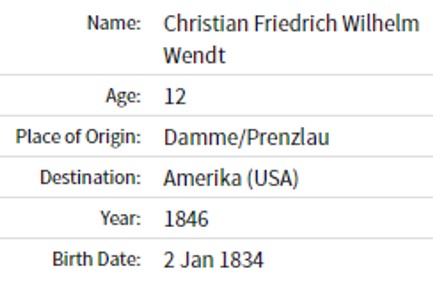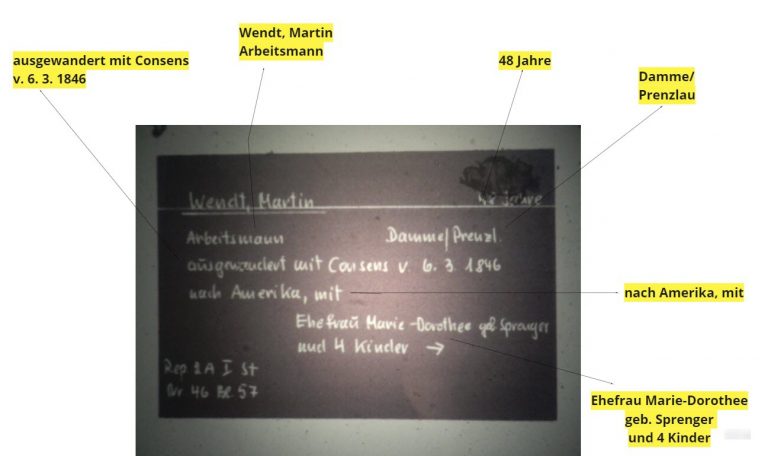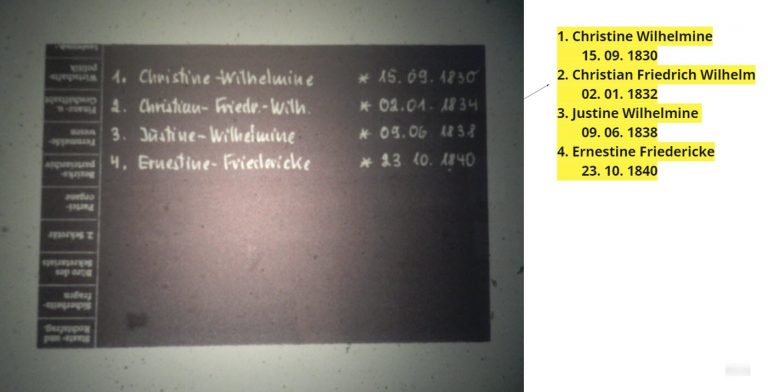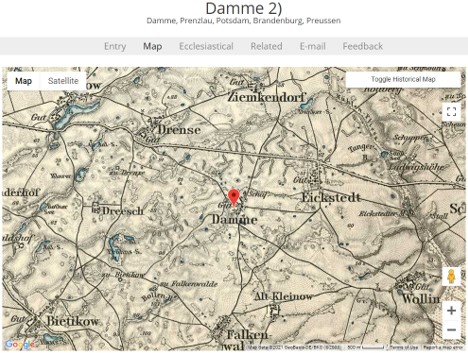One of the most difficult challenges that genealogy researchers encounter in German genealogy is the inability to discover the last place of residence for a particular line back in the homeland.
When I first started researching my Wendt immigrant ancestors years ago, I was fortunate to have learned the name of their last place of residence early on in my journey. The family research passed down to me was that my Wendt ancestors were either from modern NE Germany or Poland (near historical Stettin). I wanted to know exactly where in the homeland they came from!
Brandenburg Breakthrough!
To that end, I entered basic family information into the database on Ancestry concerning my second great-grandfather, Christian Wendt. Within seconds, I experienced an unforgettable, genealogical epiphany!
The Ancestry result was an indexed entry based on German emigration records, known as “Auswanderungsakten” from Brandenburg, Prussia. In other words, I had just encountered a primary-derived entry of Christian’s (imminent) emigration, that of his permission to leave Brandenburg, Prussia to America.

The entry on Ancestry matched Christian’s known birth date. Moreover, it disclosed his full name, the year that he emigrated to America, as well as the exact village and its associated historical Kreis, or district, of his last place of residence back in the homeland. Consequently, this amazing development got me across the pond!
While this remarkable discovery made all the difference, I wanted to see a copy of the original Auswanderungsakt. I did not have to wait very long. While the Family Search microfilm/microfiche loan service was still taking place, I was fortunate to view a copy on microfiche!
Exploring the Brandenburg Auswanderungsakten

While sifting through the microfiche from Family Search of a copy of what was described differently-albeit slightly-as Auswanderungskartei (or emigration card file) for instances of the Wendt surname, I came across a record of interest. It was for a Wendt family who was from the village of Damme in historical Kreis Prenzlau. The card listed a certain Martin Wendt, a working man, who was 48 years old. He emigrated with consent in 1846 to America, along with his wife, Marie-Dorothee geb. (née) Sprenger and four children. Initially, I had asked myself where the names of the four children were. How did Christian, my second-great grandfather, possibly fit in with this family? By advancing further through the microfiche, it did not take long to discover the names of those four children themselves!

As it turned out, the Wendt Family from the village of Damme consisted of Christian’s parents and sisters. The birth dates listed on the other part of the card corresponded to that of Christian and his sisters. Thus, by digging deeper, my quest to learn more about this particular Brandenburg record resulted also in tracing the Wendt line back another generation. At this point in my German Genealogy journey, I was in Prussian Genealogy heaven! I had discovered, then, that not only did I have German roots, but I had Prussian roots as well.
Ancestral Location on Meyers Gazetteer
If you know of a particular historical place name that was a part of the German Empire and wish to locate it, I strongly recommend using Meyers Gazetteer. It provides the historical, jurisdictional details that you would expect from a gazetteer. Moreover, in a majority of cases, it displays a corresponding historical map of what a particular location would have looked like during the period of the German Empire.
To locate a place name on Meyers Gazetteer, choose this link here: https://www.meyersgaz.org/.
Using the aforementioned Damme, Kreis Prenzlau example, one can view where my Wendt immigrant ancestors had resided decades earlier on a map from the German Empire era.

Prussian Genealogy on Facebook
Prussian Genealogy on Facebook is a global and supportive community with over 20,000 members. I created the community as an extension of my passion for Prussian genealogy and for the purpose of helping others just starting out or wishing to dive deeper into this fascinating area of genealogy.
The Prussian Genealogy community also promotes German and Polish Genealogy, DNA, History, Culture and other aspects as they relate to historical Prussia. The community would not be where it is today were it not for the help of the many members in the group who have made and continue to make a difference in the lives of those who wish to better understand their Prussian roots!

Stephen Wendt, MLIS, holds a master’s degree in Library and Information Science from K.S.U. He is a professional genealogist and speaker. At the virtual IGGP conference coming up in July, Stephen will be presenting, “Searching for Your Elusive Prussian Ancestors: A Case Study.”
Stephen founded Tree Tidings Genealogy and assists global clients with their Prussian and German research. You can learn more about his business at his website: https://www.treetidingsgenealogy.com/
You can follow him at the Prussian Genealogy and Heritage Facebook Page as well: https://www.facebook.com/groups/prussiangenealogy

4 Responses
Thank you for that information. My wife’s side came from that region. They knew the towns of origin, but I have not investigated the Auswanderungsakten connections. You imply this information is found on Familysearch.com. Would you be able to share the link to that site? How far back in time do those records go? Are there such records for Baden? Baden is where my side came from, and they left in the early 1700s, which might be before such records were required. Is there a similar helping group as Prussian Genealogy / German & Polish Roots, DNA, History & Culture for Baden, and southwest Germany?
I enjoyed your article.
I found the name of a town in the passenger list, but it wasn’t until I looked at MeyersGaz that I found the actual smaller town where they went to church. The passenger list showed they were from Lübz (population 3633); however, I didn’t find the actual church he attended until I looked in Benthen about 4 miles away, which had a population of 145. However, he actually lived in Passow, which had a population of 28!
Another find was “Auswanderung aus dem Kreis Minden 1816-1933.” This listed the family full names and birth dates. See some pages I used in Memories at https://www.familysearch.org/tree/person/memories/KJWY-29L
Lastly, a find was the German church records in downtown Cleveland, OH. It listed my great aunt and her husband in their marriage record and also the towns where they came from in Germany. A presentation I viewed said that 60% of the time you can find the hometown by searching the church records here in the US.
One of my g-g-grandfathers came from Schleswig when it was part of Denmark. He was a Danish citizen according to his US naturalization records, and census records and family lore is that he was Danish. He came to the US before Prussia took it over. Would I look for baptism records etc in Germany or Denmark?
I enjoyed reading your BLOG and remembering my experience finding my Brandenburg, Prussian ancestors. It was much like yours but different. I was researching at the FamilySearch Library and was directed to the cabinet where the micro-fiche files were stored. It was magical finding the Christian Friedrich Adam Oldenburg family Auswanderung which gave them permission to emigrate to America 14 February 1866. On the second page was listed the name of his wife and their five children all with three names and their birth dates. It was exciting to see the name of their village Beutel, and their parish, Templin. There it was all laid out and easy to understand. Like you I went to Meyer’s Gazetteer and found their village and parish. A few weeks ago, I again looked at Meyer’s Gazetteer and with the help of Google Street View I approached the still small village of Beutel and turning left I was quickly out of the town. Close to the road was farm land and I wondered if this was the land Christian helped to farm as a laborer.